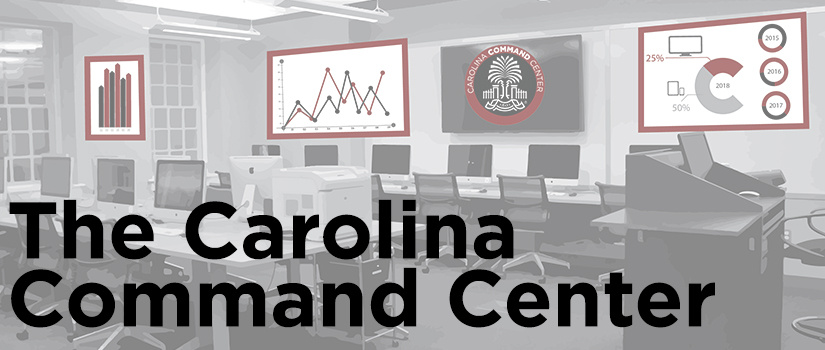Posted June 15, 2018
By Rebekah Friedman, CIC communications manager
Imagine this: A local TV station comes to campus to interview a team of CIC students who have correctly predicted an upset in a major election by analyzing social media. Or maybe this one: A CIC professor makes headlines when she mines data from Twitter to predict the next evolution of a growing social movement. Or even this: A class helps a local nonprofit organization triple its donations by figuring out exactly what kind of Facebook content is most effective.
When the Carolina Command Center opens in early 2019, students won’t have to imagine these scenarios.
The Carolina Command Center is the CIC’s high-level social media monitoring and analytics classroom/research lab. It’s the next logical step for a college positioned within the expanding juncture of data and communications. And it’s going to impact everyone, from our students, to our faculty, to the world around us.
For those of you who missed all the buzz about it during our fundraising campaign earlier this year, we’ve put together a helpful explainer on what the Carolina Command Center is and what it will mean moving forward:
What’s going to be in the center?
The Carolina Command Center will be equipped with enough monitors and wall-mounted
TV screens to accommodate classes, training sessions and demonstrations or presentations
for outside groups. Software will be an important part of the operation. The CIC has
chosen Crimson Hexagon, a professional-grade analytics software which will allow users
to do everything from sentiment analysis to identifying emerging trends. We’ll also
be adding in some signage and other modern touches to give the space a visible identity
as one of the top centers of its kind in the Southeast. And, a center like this one
won’t run itself. We’re planning to hire a staffer who will become a Crimson Hexagon
guru, train faculty and students and manage the creation of valuable insight reports.
Where will it be?
We’re currently looking at two rooms on the first floor of the School of Journalism
and Mass Communications to serve as our classroom and lab. We’ve also identified space
in Davis College, home of our information science program, to serve as a satellite
station since the center will be critical to these majors and faculty members as well.
In addition to housing the command center, these spaces will still be available for
classroom use.
When will it open?
Our tentative launch date is January 2019.
How will it benefit students?
When we talk to the companies and organizations that hire our students, one of the
things we hear most frequently is how critical it is for new hires to have a comprehensive
understanding of social media and data analytics. These companies aren’t just looking
for employees who can schedule Instagram posts — they want employees with social media
intelligence skills. This means employees who understand which metrics to track for
an accurate snapshot of engagement, know how to identify industry trends and can accurately
predict consumer behavior. What we envision is a center that will train students
on how to do all of this. And, when those students graduate, these skills will make
them extremely marketable to potential employers.
Yeah, but what about my specific major?
Here are some ways you might be able to apply what you learn in the Carolina Command
Center in your future career:
- Advertising: Learn how to gauge the success of your clients’ advertisements by analyzing online conversations and public sentiment. Modify future campaigns based on findings, increasing your clients’ revenue. Identify and track relevant consumer trends to enhance the effectiveness of advertising campaigns. Analyze competitors’ advertisements, a tactic that could provide useful insight when developing your own campaigns.
- Information science: Help your company develop strategic plans related to marketing, finance or business by gleaning relevant data from social media. Shape company strategy by studying data on emerging industry trends and competitive intelligence.
- Public relations: Learn how to utilize social media for crisis management – this could include monitoring online conversations and media coverage, as well as measuring public sentiment. Help your clients identity potential crises and opportunities by tracking trending topics among key audiences.
- Visual communications: Help your company identify which graphics or visuals resonate best with potential consumers on social media. Learn how to generate infographics from social media data.
- Journalism: Identify emerging conversations and hot-button issues among key audiences. Trace viral news back to its origin. Study the consumer response and public sentiment of your stories; break down your findings by key demographics.
- Mass communications: All of the above could apply to this versatile major.
How will it benefit faculty?
A team of faculty recently traveled to UGA to check out their SEE Suite, which is
a very similar operation. Within just a few minutes, one of our journalism professors
was able to pull data from social media conversations that showed most people had
positive feelings about the NBA potentially hiring a female head coach. Obviously,
the professor would spend much more time gathering data if it were for a formal study,
but the experience illustrates just how effectively the center will facilitate student
and faculty research.
How will it benefit the world beyond the CIC?
As we explained in the scenarios at the top of the page, students will learn to use
the Carolina Command Center by providing valuable data for real clients. These could
include local businesses and nonprofits and even university departments. Just think
of the impact this could have on the local economy.
The center will improve the caliber of our graduates and faculty research, thereby enhancing not just our international reputation, but the university’s too. In short, it helps position us as a thought leader. With nearly unlimited data at our fingertips, our hope is that the University of South Carolina will become a place where people turn for critical economic, scientific or cultural data.
